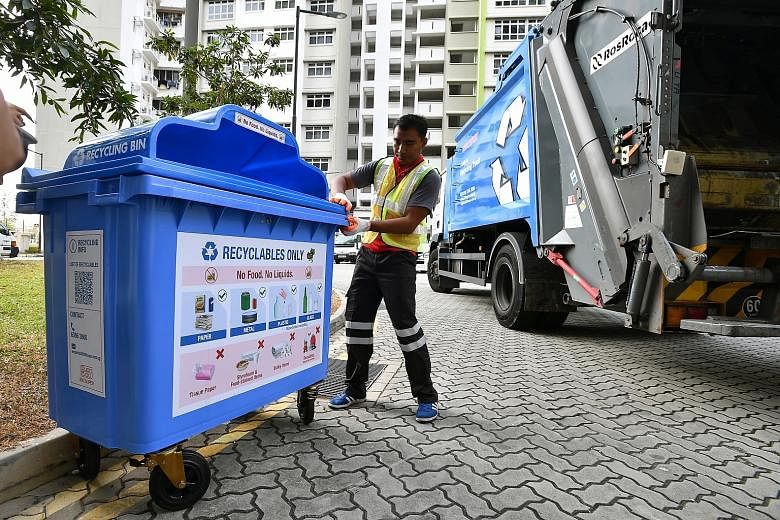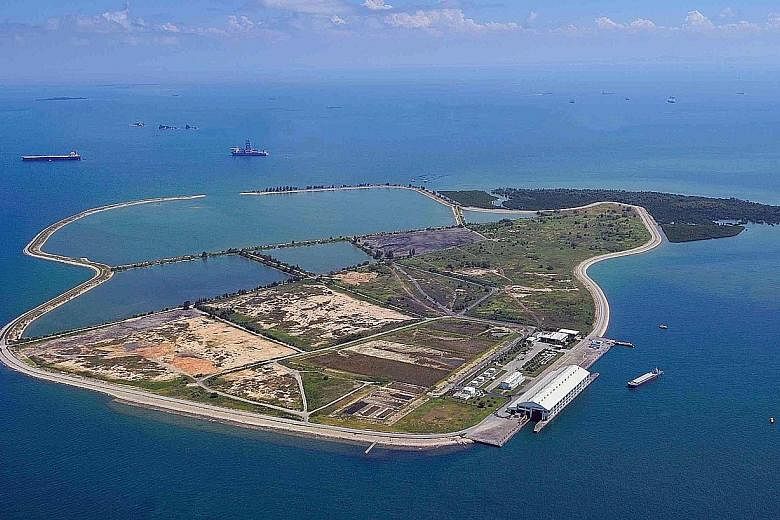The lifespan of Singapore's only landfill is shortening, and to help extend it, the Government yesterday announced a new waste reduction target for the nation and an action plan on how to achieve it.
By 2030, Singapore wants to send about one-third, or 30 per cent, less waste to offshore Semakau Landfill to help it last longer than the projected 2035, said Senior Minister of State for the Environment and Water Resources Amy Khor yesterday.
Already, the landfill has seen its lifespan shorten from 2045 to 2035. About 2,100 tonnes is now sent to the landfill daily.
Achieving this target would require regulatory teeth, new infrastructure, research and development, and nudges to encourage people to recycle more - solutions laid out in Singapore's first zero-waste masterplan launched yesterday.
In explaining the importance of tackling waste, Dr Khor said this was a way of supporting climate mitigation efforts. Scarce resources are depleted when people produce, consume and throw away, she said.
"The associated activities - be it mining, manufacturing or shipping - also emit greenhouse gases. These gases trap heat in the atmosphere and contribute to climate change," she added.
The Resource Sustainability Bill will be passed in Parliament next week, she said. This will provide regulatory teeth for the Government to implement measures to reduce waste from three key streams: electronic waste, food waste and packaging waste.
The masterplan also looked into infrastructure.
Singapore is now exploring the establishment of local e-waste recycling facilities for items such as large household appliances and lamps; and is also looking into available plastic recycling solutions and technologies and their suitability for Singapore.
China's recent ban on plastic recyclables has shifted the trade patterns of this material, Dr Khor said.
"We believe that closing the plastics loop domestically, to extract treasure from trash, is an area where both economic and environmental opportunities lie," she said, citing the example of mechanical recycling to turn waste plastics into plastic pellets for new products.
Ms Lee Bee Wah, an MP for Nee Soon GRC, said the masterplan, launched soon after Prime Minister Lee Hsien Loong sounded the clarion call on dealing with climate change at the National Day Rally earlier this month, would raise public awareness of the issue.
She said: "What I hope to see is this message trickling down to individuals. Nothing is too small or too little to save the earth for the next generation."
Yesterday, Dr Khor also unveiled a new look for recycling trucks and new labels for bins.
Singapore's domestic recycling rate has fared poorly over the years, hovering in the region of 20 per cent. In comparison, the industrial sector recycled 74 per cent of its waste last year. Among the reasons for the poor domestic recycling rate is the contamination of recyclables, which happens when food is thrown into recycling bins.
The new labels prominently state that no food or liquids are allowed in the big blue recycling bins.
A spokesman for the National Environment Agency said the cost of the new labels was "a very small fraction of the value of the public waste collectors' contracts".
She added: "If residents follow the illustration... the domestic recycling rate will improve, and this will increase the ease and efficiency of the public waste collectors' work."
Waste Management and Recycling Association of Singapore chairman Melissa Tan said the waste reduction target was achievable - if individuals also stepped up to recycle more. "The industrial sector has already done its part. If individuals too make the effort to recycle more, then hitting the target is very achievable. The new recycling labels may help in this area."
- Additional reporting by Jacklin Kwan


